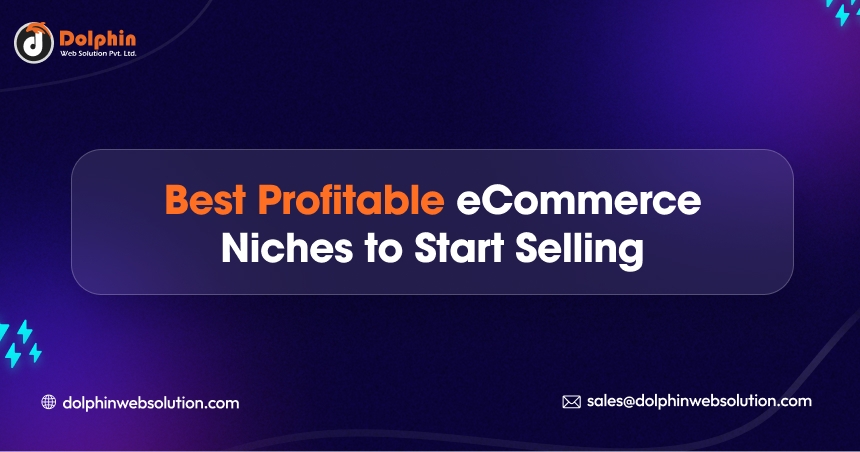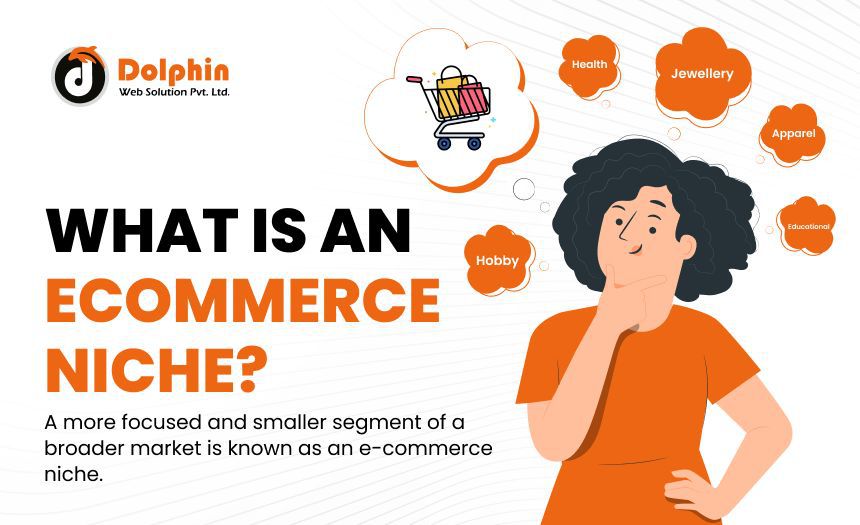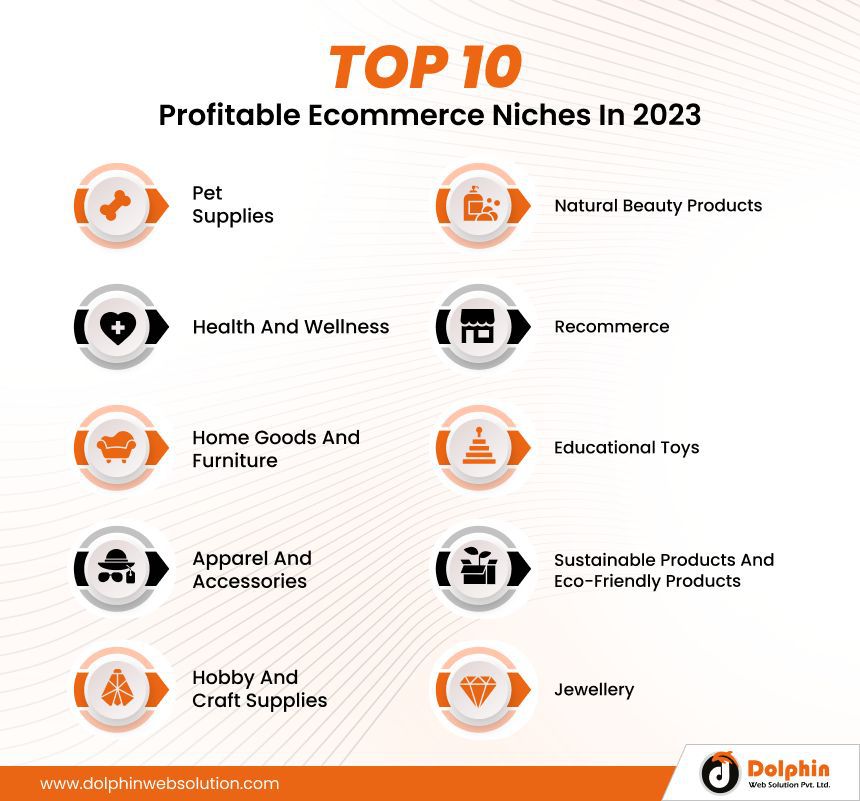Best Profitable eCommerce Niches to Start Selling

Table of Contents
Summary :
Examine the most potential eCommerce markets, including digital services, health and wellness, and ethical and sustainable goods. Success in this dynamic environment depends on matching your specialization to customer tastes and market needs.
Introduction
Selecting the appropriate niche to enter the constantly changing eCommerce market might be the difference between success and obscurity. As 2024 approaches, the eCommerce sector is still rising to unprecedented heights due to shifting customer tastes and developing technological advancements.
Finding the most lucrative eCommerce categories and best ecommerce CMS to flourish in the upcoming year is crucial, regardless of your experience level as an online entrepreneur or your desire to take advantage of the chances presented by the digital marketplace. Come along as we examine the top eCommerce markets that have a ton of potential and provide both seasoned e-commerce experts and prospective online company owners with a helpful road map. Best Ecommerce development company can help you build your ecommerce site as per your particular niche requirement and will also guide with cost to develop an ecommerce website in India.
According to Digital Commerce 360, customers spent $870.78 billion with American retailers online last year. E-commerce sales saw a 14.2% increase in 2021, and projections show penetration rates rising from 15% to 25% by 2025. To succeed, a robust e-commerce strategy is essential. Some products are more accessible to sell than saturated categories, demanding a unique approach. Check out this blog article to know some of the best profitable ecommerce niches and start selling your products today!
Also Read:
Top 7 Magento Development CompanyWhat Is An Ecommerce Niche?

A more focused and smaller segment of a broader market is known as an e-commerce niche. These niches usually target very particular types of buyers. Their target market is considerably smaller, and they have a distinct personality that sets them apart from their parent group.
Eco-friendly personal care products, recycled yarn hiking gear, CBD pet food, organic skincare supplements for women, handcrafted jewellery, and sustainably manufactured home goods are a few examples.
Top 10 Profitable Ecommerce Niches

1. Pet Supplies
The popularity of pet items has surged as our love for animals grows, with dogs and cats dominating the internet. People treat their pets like family, exploring new ways to ensure their well-being. Many now opt for natural, organic food for their furry friends. According to a poll, 43.6% of respondents are pickier about what their dogs eat than they are.
Pet wellness products, like organic meals, are also becoming more popular. There are many helpful items to sell to pet owners, such as cat toothbrushes, CBD oils that lessen anxiety symptoms, and vitamins that aid gastrointestinal health.
2. Health And Wellness
The health and wellness food market is anticipated to expand by 9.20% to reach 162.09 billion by 2026, according to Global New Shire. It’s simple to forecast the rising demand for this eCommerce sector because fitness and health are the most popular New Year’s resolutions in 2024. However, this is already one of the more popular eCommerce areas; therefore, there are undoubtedly many rivals in this industry. The only methods to differentiate yourself are always to be abreast of the newest fashions or provide exclusive goods no one else has.
In 2022, there will still be a lot of space for new entrants because this enormous niche still has a lot of uncharted territory. Based on Google Trends, the following health food micro-niches show positive growth trends.
3. Home Goods And Furniture
While specific e-commerce segments are more resilient than others, the home décor industry is still growing. 2024 will see an increase in individuals giving their homes’ aesthetic appeal and comfort priority. There are innumerable highly sought-after goods in the home décor area, ranging from wall art to carpets to furniture. Because lighting fixtures can change the atmosphere of any space, they are very well-liked.
E-commerce retailers may thrive in this burgeoning area by catering to the distinct interests of their clients and providing a variety of styles and materials. Buying equipment for the house is a trend that is not likely to stop anytime soon. The work-from-home (WFH) trend and digitization will contribute to the sustained growth of this specific eCommerce niche in the future days.
Furthermore, this expansion will be aided by the growing popularity of freelancing. Research filed by Modor Intelligence projects that by 2025, the home office market’s CARG (compound annual growth rate) will increase by 5.5%.
4. Apparel And Accessories
In eCommerce, apparel and accessories have always been essential, and in 2024, there are more exciting prospects in this market than ever before. The opportunities for online merchants are numerous, ranging from the emergence of fashionable categories like athleisure, which combines comfort and style, to the rising desire for artisanal and handcrafted items. But in this competitive market, your ability to stand out and separate yourself will determine your success. To succeed, remember that branding is a crucial instrument for creating a distinctive identity and building relationships with your target market. Social media becomes your doorway to interacting with potential clients and developing a devoted following in this visually-driven day.
Leveraging the impact of social media sites such as Instagram and TikTok may help you grow your clothes and accessories company to new heights. We’ll examine tactics and insights as we dig further into this market to assist you in navigating the ever-changing eCommerce industry and securing your place as a successful participant in 2024.
5. Hobby And Craft Supplies
In the dynamic realm of eCommerce niches, hobby and craft materials have surfaced as a valuable asset expected to reach significant significance by 2024. This market offers a plethora of prospects as free time grows and the need for hobbies keeps rising. Consider focusing on niche markets like knitting, baking, or the arts to tap into this market efficiently. By supplying specialized tools and resources, you may customize your products to appeal to these vibrant communities.
Success in this market requires an awareness of the various demands of hobbyists and the provision of goods that facilitate their artistic endeavors. Your job is to be the go-to person for enthusiasts, whether they are home bakers looking for unusual cake decorating ingredients or knitters looking for high-quality yarn. eCommerce owners may carve out a niche by being the go-to source for artists and craftspeople as leisure takes center stage in consumer lifestyles. Come along as we examine the methods that will help you succeed in the world of hobby and craft supplies as we dig into the nuances of this booming industry.
6. Natural Beauty Products
The market for beauty items has existed since the beginning of time. Beauty merchants were ubiquitous in both the East and the West, selling everything from fragrances to rare oils, rouge to eye shadows. What has altered in 2024, though?
The beauty industry’s niche sector has embraced and expanded the “cruelty-free” and “chemical-free” product trend. Amid the pandemic, heightened health awareness has fueled interest in “natural beauty products” and the appeal of “vegan” merchandise, capturing consumers’ attention.
In 2020, the natural cosmetics market was projected to be valued $33.4 billion. As of right now, the predicted valuation for 2030 is $56 billion. It is reasonable to believe that new business owners offering vegan cosmetics can have a lasting impression on the sector if their revenue share increases steadily. Rice, vitamin C, and tea extracts are common vegan bases.
Developing natural items and testing them are not difficult tasks. As an American business owner, you may quickly locate the FDA rules to comprehend the manufacturing specifications and securely promote your goods.
7. Recommerce
Searching for ways to save expenses is becoming increasingly common in these uncertain times. ReCommerce, or buying and selling used goods, is growing in popularity. These products are often provided at a lower price than brand-new ones. Some instances are used electronics, used clothes, used furniture, used books, used tools.
8. Educational Toys
More parents, particularly those whose kids work from home, want to keep their kids active. The best toys are the educational ones. E-commerce specialty items promoting critical thinking and creativity in children include puzzles, board games, STEM toys, educational books, and science kits. These products foster problem-solving skills and are in high demand.
9. Sustainable Products And Eco-Friendly Products
An eCommerce company may wish to take advantage of the expanding trend of sustainable items. According to recent surveys, a significant portion of consumers between half and two-thirds are ready to pay a premium for sustainable items. Fortunately, this may work to your benefit even in some of the other sectors that we’ve covered here. For instance, you may begin offering goods like recyclable containers for storing leftovers or toss cushions for home décor made of bamboo cloth. One profitable and excellent choice for eCommerce categories is selling more eco-friendly products like beauty and cosmetics.
10. Jewellery
The jewellery industry has always been cutthroat. Similar to cosmetics, they have been in use for many ages. However, the sector gained a new edge with the growth of eCommerce.
Some industry research indicates that by 2024, the internet jewellery market will have grown to $92.7 billion. The internet market heavily advertises our penchant for glitzy items, classic gold, diamond, silver jewellery, and high-end apparel. Nonetheless, throughout the last five years, many niches have emerged and become more prominent.
Signet rings, decadal charm necklaces, gemstone jewellery, and even paper jewellery are a few examples. Handcrafted jewellery is a growing specialty with a respectable year-over-year growth rate.
Natural stones and organic materials have become more and more popular among makers of handmade jewellery. Materials like shells, wood, and semi-precious stones are abundant in recent innovations.
How To Pick A Niche For E-Commerce
So, what is the process for identifying your niche? It’s essential to have some strategies under your sleeve so that you can get started right away and avoid finding yourself gazing at a brick wall.
1. Look At Current Trends
You may use Google Patterns to discover when people have been looking for a specific term, or you can see patterns everywhere. I prefer to search tools like Semrush and Sistrix in addition to Google Trends for emerging or untapped niche prospects. When combined with data from Google Trends, you have some robust information to work with.
2. Find A Need
There are several motives for a niche product purchase. They can’t obtain it near them, or the options available now are insufficient. Selling goods in a less competitive market may be the secret to your small business’s success. The adage “necessity is the mother of invention” is well-known, and it has never applied to this situation more well.
3. Look At Things You’re Passionate About
Passion is vital when starting a niche business. Your genuine interest in a product or service gives you a competitive edge, as it’s hard to succeed in something you don’t genuinely care about. It enables you to produce better longtail content for blog articles and other content that Google prefers to see on a website, in addition to better content centered around the items.
4. See What Others Are Searching For
This is when keyword research comes in handy. Others could be looking for “vegan dog food” or “dog food without meat,” but since there may not be much competition for such keywords, it’s possible that their demands aren’t being met. Although the Google Keyword Planner tool might be helpful, the best statistics will only be obtained with an Adwords account. But fear not—there are substitutes.
For this sort of study, Keyword Keg is excellent and offers more information than Keyword Planner does not. CTR Scope is a handy indicator showing the likelihood that a user would click on an organic result rather than a sponsored result.
Search engine optimization (SEO) keyword words can provide valuable data that will assist you in selecting the appropriate niche for your sales.
5. Scan Through The Category
Occasionally, even perusing a product category reveals what’s lacking.
Exploring popular websites like Etsy, Amazon, and eBay helps me spot market gaps. Exploring popular sites like Etsy, Amazon, and eBay helps identify gaps. Top sellers are evident, but your strong interest in the market makes it easier to spot what’s missing and seize opportunities.
How Do I Find A Profitable Ecommerce Niche?
It takes extraordinary thought and study to choose the ideal niche. I’ll go over some essential pointers and tactics below that will help you focus on the items that would be best for your particular situation regarding selling online.
1. Understand Your Interests & Expertise
The first step on your path to a lucrative e-commerce specialty is self-reflection. About what do you genuinely feel passionate about? Which domains do you hold knowledge in? As the basis for your specialty selection, start by enumerating your talents and hobbies.
You’re more likely to stick with something and remain involved when you have a strong enthusiasm for it, even in the face of difficulties. Your excitement will be contagious to your target market, facilitating the ecommerce development of a devoted clientele.
2. Identify Market Demand & Trends
Researching popular items may help you find potential new product ideas and niche products that the market does not yet have, in addition to providing a better understanding of the competitors. You may research anything from general category phrases to particular items and terms using tools like Google Trends to see what is (or isn’t) consistently and steadily gaining popularity among consumers:
You may begin concentrating on the specifics of your marketing plan and Search Engine Optimization (SEO) after you’ve determined the particular goods you want to center your e-commerce business around.
To find popular search phrases associated with your topic, use keyword research tools such as SEMrush and Google Keyword Planner. Seek out terms with many searches since this suggests a possible clientele.
Analyze your rivals in the same category as well. Do any well-established companies, or is this a primarily unexplored market? A profitable business requires a balance between demand and competition. Monitoring customer feedback on platforms like Reddit and Quora can provide valuable insights into the reputation and sentiment surrounding specific companies, products, or topics, helping you make informed decisions.
3. Assess Profitability
Although enthusiasm and demand are essential for a business to succeed, the ultimate objective is Profitability. Examine the dynamics of pricing in your industry. Exist any goods or services with substantial profit margins? Are there any holes in the market that you might fill with your unique offering? When measuring Profitability, consider the costs of making or purchasing items, shipping, and marketing. Your best bet is to choose a niche that provides a decent balance between costs and potential earnings.
4. Analyse Target Audience
It’s critical to comprehend who your target audience is. Identify the characteristics, hobbies, and problems of your ideal client. Choose a specialty that best suits their requirements and tastes. Develop buyer personas to learn more about your prospective clients. This will direct the development of your content or product and assist you in building a closer relationship with your audience.
5. Build A Memorable Brand
Your identity in the e-commerce space is your brand. Make a visually stunning logo that fits your niche, and pick a catchy name. Maintaining a consistent brand throughout your website and social media accounts fosters audience awareness and trust. Later, when you’ve begun building your brand identification and online presence, you may explore joint venture options with other influencers and businesses in your industry. Whether through affiliate marketing, cross-promotion, or another strategy, collaborating with other publishers and sellers in your industry may help you increase your exposure and reach.
6. Strategically Select An Ecommerce Solution
Putting your ideas into practice comes next after you’ve chosen your e-commerce specialty and the goods you wish to offer. Choosing the appropriate e-commerce platform to display and market your items is essential. One of the most lucrative ecommerce niches out there may be yours. But success is unlikely if customers can’t quickly discover and browse your online business.
While selling on Amazon, Etsy, and Shopify is convenient, owning your e-commerce website offers complete control over pricing, support, design, and branding, maximizing earnings and independence.
Benefits Of Finding An Ecommerce Niche For Start Selling
Niching down can have significant benefits, even if it may seem counterintuitive to focus on a smaller market. The benefits are listed below.
1. Your Marketing Expenses Will Go Down
Regardless of your approach, advertising items to a specific market will be far less expensive than targeting a whole product category. Ads targeting a specific demographic, for instance, may require bidding for less-priced, lower-competition keywords.
2. You Have The Option To Charge More For Your Goods
Customers are prepared to pay extra for specialized items for three reasons:
- Demand typically exceeds supply when few brands are supplying a particular item. Customers are, therefore, prepared to pay more to access the goods.
- They are solving problems. Niche products enable buyers to address a significant, particular need in a manner that is impossible for most items.
- Earnings capacity. Because inventory can only be manufactured in specific numbers, each item must be priced more.
3. There Won’t Be As Much Competition
Aspiring business owners sometimes neglect or disregard niche markets because they believe insufficient demand exists. This implies that there will be less rivalry the deeper you go into any product area.
4. It Gets Simpler To Retain Customers
With a specialty store, gaining repeat business is frequently simpler. Loyalty is almost certain if your clients can’t acquire the goods elsewhere. Apart from this, meeting a significant yet unmet need for your clients fosters brand appreciation, which breeds loyalty.
Conclusion
In conclusion, we’ve looked at several exciting eCommerce markets for 2024, all of which are ripe with opportunities for business owners looking to establish themselves online. These niches, which range from health and wellness to sustainable and ethical products to the constantly growing world of digital services, represent vibrant ecosystems primed for innovation and customer-focused firms. As you consider venturing into e-commerce, remember that your friends are market research, a sharp grasp of customer wants, and flexibility.
Consider market saturation, competition, and your area of expertise and enthusiasm when choosing your niche. Finding a niche that fits both your hobbies and the changing demands of your target audience is essential to success. The eCommerce industry in 2024 will teem with opportunities for those who approach it with commitment and an open mind. Thus, go ahead and launch your eCommerce business, and be ready to change and grow as the digital environment does. Online selling is yours to mold in the future, and for those who dare, there are countless opportunities. Connect with Dolphin Web Solution for Ecommerce website development.

